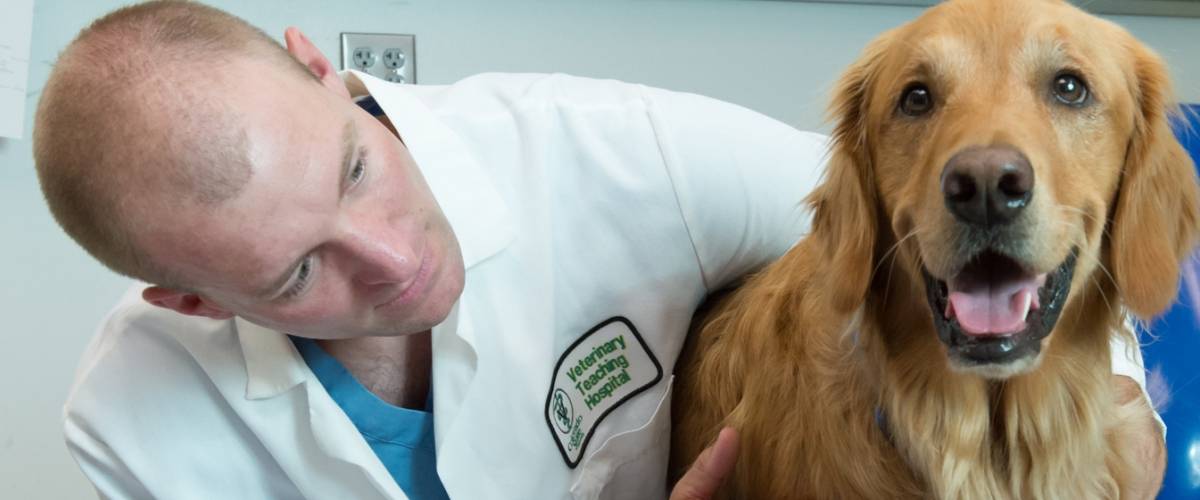
DENVER/March 4, 2021 – For many dogs diagnosed with osteoarthritis, painful joints diminish the quality of life they might otherwise enjoy. Now, Morris Animal Foundation-funded researchers at Colorado State University and the University of North Carolina are studying the potential of gene therapy – reprogramming cells – to treat dogs with this debilitating disease.
“We need a treatment that stops the progression of osteoarthritis; that decreases the long-term inflammation in the joints,” said Dr. Felix Duerr, Assistant Professor of Small Animal Orthopedics and Sports Medicine at CSU. “Current treatments to control the pain fall short and often have complications, so if we can develop a minimally invasive method to successfully just treat that pain, that will be a win.”
Gene therapy is cutting-edge biotechnology that works by reprogramming cells already present in the body through the transfer of genes. In this project, researchers first manipulate viruses so they no longer cause disease but still retain their ability to invade cells. Then scientists use these viruses to transport a desired substance when they invade a target cell.
“We may not be able to cure arthritis or turn back time, but gene therapy holds real promise to give dogs with this disease much needed relief,” said Dr. Janet Patterson-Kane, Morris Animal Foundation Chief Scientific Officer. “If it we can provide long-term support to joints by slowing or even reversing progression of osteoarthritis with a simple injection, that would be fantastic.”
The research team at CSU’s Veterinary Teaching Hospital and Orthopaedic Research Center, within the C. Wayne McIlwraith Translational Medicine Institute, along with University of North Carolina Gene Therapy Center collaborators, have perfected a gene therapy protocol over the last two decades to treat horses with osteoarthritis. They use an adeno-associated virus (AAV), which normally causes respiratory infections in humans, and modify it to deliver a segment of DNA that is coded for the protein interleukin 10 (IL-10). IL-10 is an important substance that the body produces to dampen inflammation. Horse joints and dog joints are similar biologically, so the team believes the approach perfected in horses should likely work in dogs.
For this study, CSU’s team is one of the first trying to determine the most suitable serotype, similar to a strain, of AAV to eventually enter a dog’s joint cells. The researchers already have determined serotypes that will not damage cells and are inserting the IL-10 code into them. They then inject the serotypes into stored dog tissues to discover how effectively the serotypes gain entry into cells and produce IL-10.
Once the best viral vector is determined, the team will take joint cells and put them in a culture dish with the inflammatory substances that cause joint pain associated with osteoarthritis. Then they will introduce the virus to see how well it transfers its genetic material and if this therapy can decrease inflammation in the joint cells.
If successful, the team will move on to a small safety study in dogs with osteoarthritis and then a larger clinical trial to test the efficacy.
Osteoarthritis is a chronic, progressive joint condition of dogs, affecting approximately 14 million adult dogs in the United States alone. Cited as a leading cause of euthanasia in dogs, it causes pain and discomfort, limiting mobility and negatively impacting quality of life. While medication and physical therapy can help many patients, these treatments often fall short as long-lasting pain relief for the degenerative disease.
About Morris Animal Foundation
Morris Animal Foundation’s mission is to bridge science and resources to advance the health of animals. Headquartered in Denver, and founded in 1948, it is one of the largest nonprofit animal health research organizations in the world, funding more than $136 million in critical studies across a broad range of species. Learn more at morrisanimalfoundation.org.




